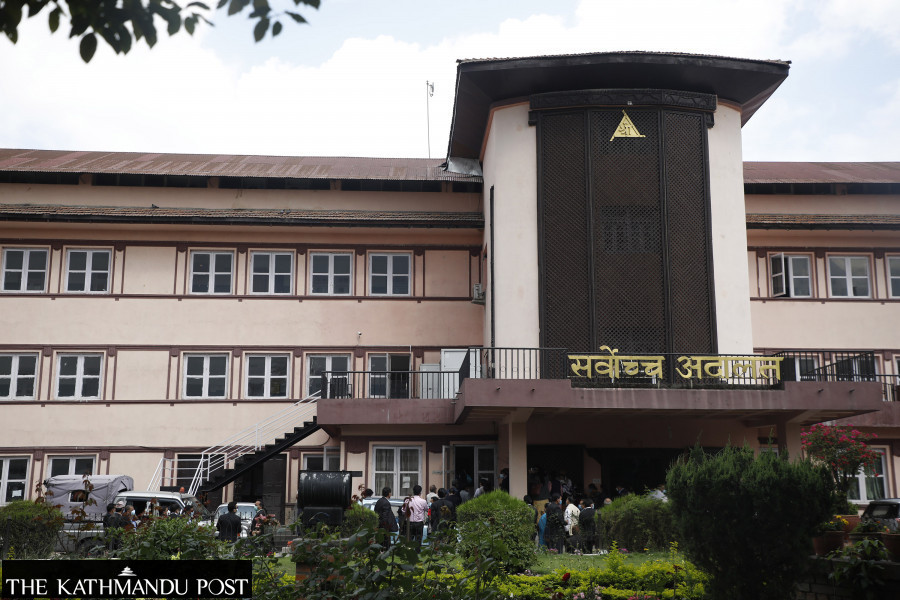National
Despite current calm, standoff in Supreme Court portends larger complications
Constitutional Bench is unable to sit, Judicial Council is ineffective and Judicial Service Commission hasn’t met, delaying judges’ appointments, promotions and transfers.
Binod Ghimire
It looks like it’s all quiet on the judiciary front for the past few weeks, after it was rocked by protests, initially by Supreme Court justices and then lawyers. Chief Justice Cholendra Shumsher Rana was pinioned in the eye of the storm. Demands for him to resign grew louder by the day.
About a month after justices boycotted hearings, starting October 25, they, however, gradually returned to the benches. One of their demands for a lottery system to assign cases was implemented. Lawyers continued their protest, saying Rana’s resignation is their bottom line. And it seems to have petered out.
Rana has not heard cases since the introduction of the lottery system. No justice has shared any bench with him.
But he has shown no signs of stepping down. He has been discharging the mundane administrative duties by virtue of being the chief of the Supreme Court administration.
It may look like everything is hunky-dory in the judiciary. The status quo has resulted in fallouts.
The Constitutional Bench, which is headed by Rana, has not been able to sit. The Judicial Council, also led by Rana, has been rendered ineffective. Meetings of the Judicial Service Commission have failed to take place.
Observers say the status quo in the judiciary could cost the country dear.
Issues that need deep constitutional interpretation will remain pending without the Constitutional Bench. The three tiers of court cannot get judges unless the Judicial Service Commission holds its meetings.
A December 22 meeting of the Judicial Service Commission, called by Rana, was scheduled to publish the results of 18 judges for the district courts.
“Among 23 vacant positions, 18 will be filled through tests while the remaining five need to be appointed by the Judicial Council,” said Man Bahadur Karki, spokesperson for the Judicial Council, which works as the secretariat of the Judicial Service Commission.
The December 22 meeting was supposed to make public the results of the exam that was conducted on September 28 for district court judges.
The last meeting of the Judicial Council was held in July.
Amid the ongoing tussle between Rana and justices, meetings of the Judicial Council and Judicial Service Commission are unlikely anytime soon.
The meeting was deferred indefinitely saying the chairperson of the Public Service Commission, who is a member of the Judicial Service Commission, was out of the Valley.
It, however, was not clear if other members of the commission would have attended the meeting given the conflict in the Supreme Court.
The five-member Judicial Service Commission led by the chief justice has the law minister, senior-most justice of the Supreme Court, attorney general and the chairman of the Public Service Commission as its members.
According to Karki, 13 positions of judges are vacant in high courts as well.
“Similarly, three high courts—Dipayal, Surkhet and Janakpur—are without chief judges,” he told the Post.
The hearing in the Special Court has been affected as two thirds positions of the judges are vacant. Four positions among the six are vacant.
The Supreme Court itself has yet to get one justice. Apart from the chief justice, there are currently 19 justices in the Supreme Court.
The Judicial Council appoints judges and justices except for the chief justice.
Led by the chief justice, a senior-most justice of the Supreme Court, an advocate each picked by the government and Nepal Bar Association and minister for law and justice are the members of the Judicial Council.
As Deepak Kumar Karki, the senior most justice, has been refusing to share any bench with Rana, he is least likely to attend the council’s meeting even if one is called, according to a justice at the Supreme Court.
Currently Nepal Bar Association and Supreme Court Bar are protesting against Rana, the council’s member from the Bar Association too could abstain from the meeting.
Rana was appointed chief justice on January 2, 2019. He has until December 16, 2022 to serve if he does not resign.
The council has the authority to nominate judges and justices except the chief justice.
The chief justice is nominated by the prime minister-led Constitutional Council and gets appointed after getting through the parliamentary hearing.
“It is not possible to conduct the meeting of the Judicial Service Commission and Judicial Council until Rana leads them,” claims Chandeshwar Shrestha, chairperson of the Nepal Bar Association. “The deadlock hampered the appointments and growth of the judges.”
Shrestha says as Rana is the cause of the existing problems, his resignation is the best solution to the present deadlock.
“If he doesn’t like to resign he should be taking a leave for a few weeks allowing the senior most justice to call the meetings and complete the appointments, promotions and transfers,” said Shrestha. “He shouldn’t be the reason to obstruct the growth of the judge.”
However, Rana doesn’t seem to be willing to give his charge to Karki, the senior most justice. Rana took leave after testing positive for Covid-19 in the last week of November. He remained absent without passing the charge to Karki.
Constitutional experts say the delay in the appointments and promotion of the judges will affect the performance of the justices. “The appointments and the promotions will be obstructed for a year as Rana will be in service till the end of this year,” senior advocate Dinesh Tripathi, chairperson of the Constitutional Lawyers Forum, told the Post. “Rana must give a way out.”
Rana’s colleagues say they don't see Rana resigning or taking a leave. “I don’t see the problem being resolved any time soon,” a justice told the Post, on the condition of anonymity. “This is a serious issue which needs to be resolved before it's too late. However, I don’t see this happening any time soon.”




 9.51°C Kathmandu
9.51°C Kathmandu














